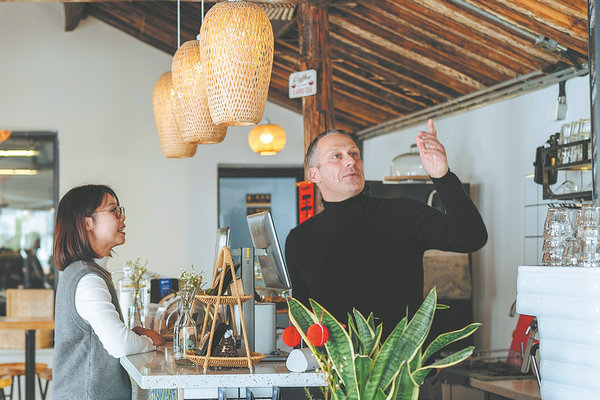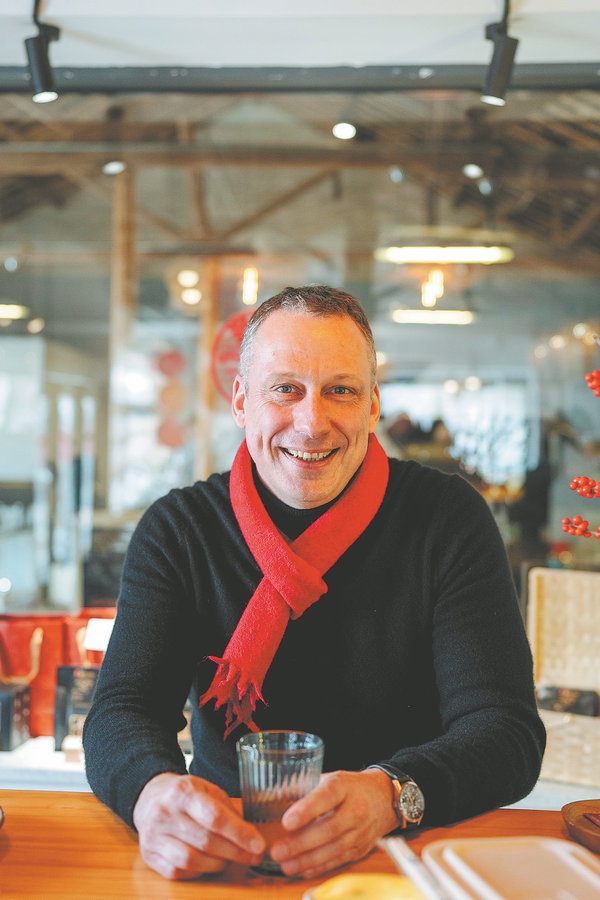

HANGZHOU — The rich aroma of freshly roasted coffee filled the air inside a quaint stone cabin in the eastern Chinese village that houses Frank Sterzer's cafe, Bamboo Coffee Roasters.
After more than 20 years as an engineer and executive with leading automobile companies in Germany and China, the German barista has found a new calling and fulfillment in the village of Maoli near Ningbo in Zhejiang province. Inspired by his lifelong love of coffee, a passion for roasting beans prompted Sterzer to turn what had been a hobby into a thriving business.
"Zhejiang's countryside has excellent infrastructure and beautiful landscapes, and I find it the ideal place to live," Sterzer says.
Maoli is located less than a 30-minute drive from the Ningbo city center, striking a pleasing balance between urban convenience and rural tranquillity.
For Sterzer, the experience of sipping a cup of coffee while enjoying a slice of handmade cake and gazing at the countryside, captures the type of serene lifestyle he hopes to share with visitors.
"Bamboo Coffee Roasters is a place to share the charm of this mountain village with visitors from all over," he explains.
The cafe is named after the abundance of bamboo around Maoli, while its logo was inspired by a photograph Sterzer took of a nearby bamboo forest.
He has also created a small coffee factory behind the shopfront, where premium beans from around the world are neatly stacked next to gently humming roasting machines. He roasts 10 metric tons a year, and the operation has become a key component of the cafe's success.
Sterzer first came to China in late 2006 as an engineer for BMW in Shenyang, capital city of Liaoning province. Over the years, he also worked in Chengdu, Sichuan province, Shanghai and Beijing. However, during a 2021 visit to Maoli, he fell in love with the village's idyllic setting and decided to open a cafe there.
The cafe is next to a building near the village entrance that was once a warehouse. Sterzer spent a year renovating it, carefully maintaining the building's rustic charm while introducing modern coffee-roasting equipment.
"I also received a lot of support from both my family and the village council," he says, adding that the council offered reduced rent and upgraded surrounding infrastructure, including reorganizing power lines.

Since opening in June 2024, Bamboo Coffee Roasters has quickly become a popular destination, attracting visitors from near and far — including international travelers taking advantage of China's expanded visa-free policies. Sterzer's own family took advantage of this policy, with his mother and siblings visiting last year, while his nephew is expected to arrive soon.
Before the Spring Festival, the cafe was welcoming guests from all over, including nearby cities like Hangzhou and Shanghai.
"We came to Ningbo for local delicacies like tangyuan (a type of glutinous rice dumpling) and niangao (a form of rice cake), but we also wanted to visit this coffee shop which has been recommended widely on social media," said one tourist surnamed Wang, who drove from Shanghai.
Residents have observed a positive impact since the cafe's opening. Neighboring shops report increased business, with visitors frequently purchasing snacks, beverages and local produce. Products such as honey oranges, bamboo shoots and tea have also found wider markets, thanks to the cafe's popularity.
As rural areas undergo rapid development driven by national rural vitalization efforts, more people are choosing to move to the countryside. Recently, an advertisement for jobs offering a stable income for village CEOs in Zhejiang proved a hit online. Meanwhile, the combination of faster development and modernization of rural areas has prompt a change in the composition of rural populations, with more young people, and even foreigners, choosing to settle in the countryside.
Having lived in China for just over 18 years, Sterzer was all set for his busiest Spring Festival yet.
On Chinese New Year's Eve, he and his family enjoyed a hotpot dinner and watched the Spring Festival Gala — just like other Chinese families, while his cafe remained open throughout the holiday season.
"I want more people to experience the charm of Chinese villages through my coffee business," Sterzer says.